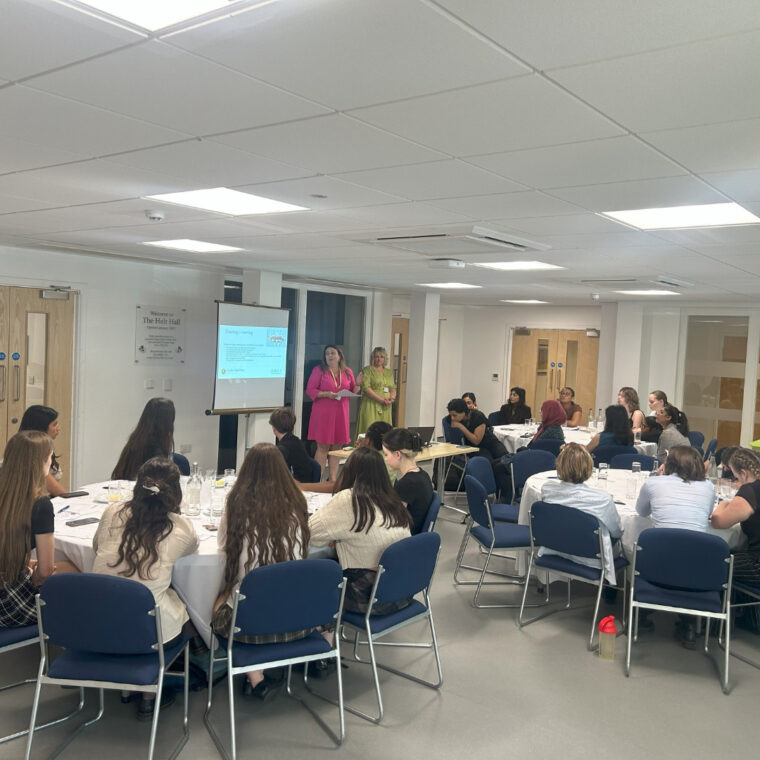News & Events
How can students develop leadership skills in school?

Why are leadership skills important at Sixth Form?
Leadership is a crucial aspect of personal and professional growth. It goes beyond merely holding a position of authority; true leadership inspires and motivates others towards a shared vision. It is never about who is the loudest person in the room!
Learning to be a leader is essential for individuals in all walks of life, as it cultivates a range of skills that enable success and positive impact. We have high aspirations for all our students in the Sixth Form, and believe that they will go on to lead the world in whatever they do.
This week, our Lower Sixth Prefects had the opportunity to participate in a comprehensive training day, with sessions run by the Senior Leadership and Sixth Form team. The thinking behind this initiative was this, if we expect our Prefects to be the leaders of the pupil body, let’s give them training delivered by the leaders of the school!
Session details:
Managing Lower School Pupils by Mr King (Deputy Head Pastoral): The ability to manage and guide younger students is a valuable leadership skill. Prefects, as role models, must understand the needs of lower school pupils and create a positive and supportive environment for their development. A great scenario Mr King gave was how to shepherd a group of Year 6s from one place to another on their Senior School taster day – with a curveball – the toilet request!
Event Planning by Mrs Webb (Assistant Head, Co-Curricular): Leaders often find themselves responsible for organising and executing events. Our Prefects will lead on many events across their sixth form years, not least the large scale Fashion Show! Event planning skills enable individuals to manage resources, coordinate tasks, and ensure smooth operations, to foster teamwork and help achieve successful outcomes. Key skills to develop here include how you “meet and greet”, what your handshake is like, if you stand or sit and what do you actually say?
Emotional Regulation and Conflict Management by Ms James (Head of Year and Psychology and Sociology): Leadership involves working with people from diverse backgrounds and managing conflicts that may arise. Emotional regulation skills help leaders remain composed under pressure, make rational decisions, and address conflicts with empathy and fairness. Examples were given on when you might lose your temper, and how to control it. Prefects considered how they need to understand different people’s emotional colours to manage their interactions.
Prioritising and Organising by Mrs Gower (Head of Year): Effective leaders are skilled at prioritising tasks and managing time efficiently. By understanding the importance of different responsibilities, leaders can allocate their efforts effectively, meet deadlines, and achieve desired outcomes. Students were able to consider a list of things that could happen all before 10am – how do they manage a potentially overwhelming list? How can they decide what needs to be done now, what can be dealt with later and what can be delegated?
How to have effective coaching conversations by Ms Gilmour (Assistant Head, Head of Sixth Form): Listening and questioning skills are essential for effective communication and understanding. Leaders who actively listen and ask insightful questions foster trust, empower team members, and promote a culture of collaboration and growth. In conversations they have with themselves, peers and young people they will have to ensure they turn off their “me listening” and truly focus on their “micro listening” (what has been said) and “macro listening” (what can they read around the words). If they listen well, there is power in the right question at the right time and it is important to think about how they pick their “effective questions”
Running Meetings by Ms Houghton (PA to Head) and Ms Davies (Head): Running productive meetings is crucial for effective leadership. Prefects were trained to facilitate meetings, set agendas, manage discussions, and ensure that objectives are met within designated time-frames. These skills enhance communication and decision-making within a group setting. This could not have been more powerfully led by members of staff who chair the most meetings in the school, and who write the most agendas and notes!
Leadership is a skill that can be developed and honed with practice and experience. The Lower Sixth Prefect training day provided an invaluable opportunity for our students to cultivate essential leadership skills. It equipped the Prefects with the tools necessary to lead with confidence and competence. Now the hard work starts, they have to put it into practice.
Learning to be leaders not only benefits individuals but also the communities and organisations they serve. As these young leaders continue to grow and refine their skills, they will contribute positively to society, inspiring others, and making a lasting impact starting here, within the Croydon High community. By investing in leadership development, we empower the next generation to navigate challenges, seize opportunities, and lead us into a brighter future. We are incredibly proud of our pupil leadership team and can’t wait to see how they grasp all the opportunities they have been given.
Ms Anna Gilmour
Assistant Head (Head of Sixth Form)
More news
Sixth Form
Lower Sixth GDST Lead Programme 2024
Junior School
Year 5 Wearable Tech Challenge 2024
Junior School



